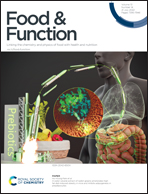Lycopene attenuates d-galactose-induced insulin signaling impairment by enhancing mitochondrial function and suppressing the oxidative stress/inflammatory response in mouse kidneys and livers
Abstract
Lycopene (LYC) possesses bioactivity to improve the pathogenesis of several chronic diseases via antioxidant-associated mechanisms. The purpose of this study was to investigate whether LYC could attenuate D-galactose (D-gal)-induced mitochondrial dysfunction and insulin signaling impairment in mouse kidneys and livers. Two-month-old CD-1 mice were treated by intraperitoneal injection of 150 mg kg−1 day−1D-gal for 8 weeks and received 0.03% LYC (w/w, mixed into diet). The results showed that LYC ameliorated oxidative stress triggered by D-gal by enhancing the Nrf2 antioxidant defense pathway and increasing the expression of the antioxidant response genes HO-1 and NQO1 in mouse kidneys and livers. LYC inhibited the MAPK and NFκB pathways and attenuated renal and hepatic inflammatory responses. Moreover, LYC upregulated the expression of genes related to mitochondrial biosynthesis and oxidative phosphorylation and improved insulin signal transduction through the IRS-1/AKT/GSK3β pathway in mouse kidneys and livers.



 Please wait while we load your content...
Please wait while we load your content...